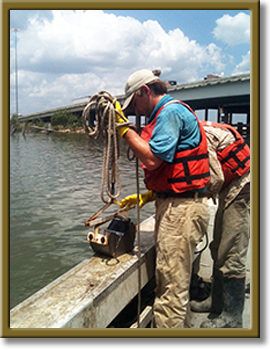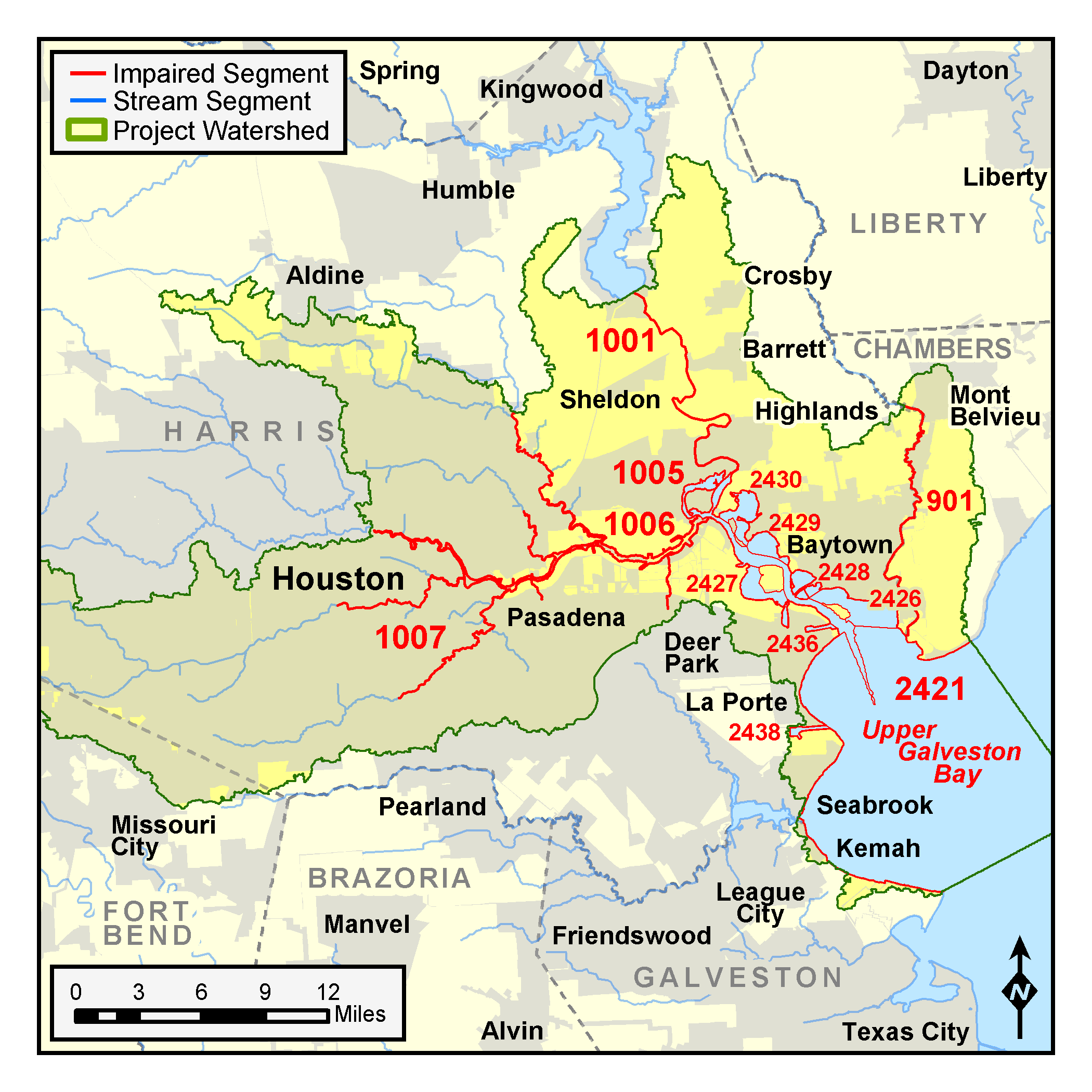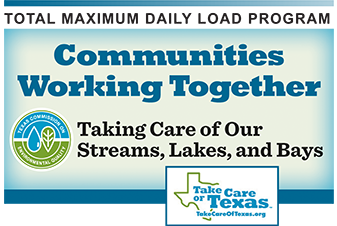Houston Ship Channel and Galveston Bay: PCBs
This completed project assessed sources of contamination in fish from polychlorinated biphenyls (PCBs). It evaluated whether total maximum daily loads are the best option to reduce PCBs so it is safer to eat fish from area waterways.
Counties: Brazoria, Calhoun, Chambers, Galveston, Harris, Jackson, Matagorda, Refugio, San Patricio, Victoria
Parameter: PCBs
Basins: Bays and Estuaries, Neches-Trinity Coastal, Trinity River, Trinity–San Jacinto Coastal, San Jacinto River, San Jacinto–Brazos Coastal
Segments:0702, 0801, 1101, 1103, 1113, 2421, 2422, 2423, 2424, 2425, 2432, 2438, 2439
On this page:
Background and Goals
High concentrations of polychlorinated biphenyls (PCBs) in fish tissue can pose a risk to consumers, even at low concentrations. Polychlorinated biphenyls (PCBs) are extremely persistent in the environment. In July 2008, the Texas Department of State Health Services (DSHS) advised people not to eat catfish species or spotted sea trout from the Galveston Bay system, including Chocolate Bay, East Bay, West Bay, Trinity Bay, and contiguous waters. The advisory was issued due to dioxin and PCBs found in fish tissue. More information about the consumption advisory is available in Advisory 50 on the DSHS web site .
PCBs are linked to increased rates of certain cancers in rats, mice and study animals, suggesting they probably increase cancer risks for humans. Dioxins in the Houston Ship Channel were assessed in an earlier project.
TCEQ completed two other closely related assessments: Houston Ship Channel and Galveston Bay PCBs Project and the Galveston Bay Survey of Dioxin and PCBs. Learn more about water quality standards and monitoring by reading Preserving and Improving Water Quality.
Watershed Description
The Houston Ship Channel system is in the San Jacinto River Basin. Its various branches originate in western and northern areas of the city of Houston and at the Lake Houston Dam on the San Jacinto River. The Ship Channel area has one of the highest densities of petrochemical facilities in the world. Facilities in the area, and the waterway itself, are important elements in the economic health of the region, state, and nation.
Houston has long been one of the busiest ports in the United States. The channel’s production of materials and its inland location have been, and will continue to be, important to the military security of the nation.
The commercial navigation provided by the channel initiated and supported the historic growth of the Houston area economy. The headwater reaches, tributaries, and fringes of both the Houston Ship Channel System and Upper Galveston Bay also provide recreational opportunities for residents.
The watershed includes portions of the counties Chambers, Fort Bend, Galveston, and Harris, and the cities Houston, Pasadena, Baytown, La Porte, and Deer Park.
The Ship Channel System consists of 14 classified segments, which together comprise the enclosed” portion of the Houston Ship Channel, with its major tributaries and side bays. This project includes ten of the Ship Channel segments:
- San Jacinto River Tidal (Segment 1001)
- Houston Ship Channel (1005, 1006, 1007)
- Tabbs Bay (2426)
- San Jacinto Bay (2427)
- Black Duck Bay (2428)
- Scott Bay (2429)
- Burnett Bay (2430)
- Barbours Cut (2436)
Also included are three segments not considered part of the Houston Ship Channel system:
- Cedar Bayou Tidal (Segment 0901)
- Upper Galveston Bay (Segment 2421)
- Bayport Channel (Segment 2438)
Get Involved
The Houston-Galveston Area Council coordinated public participation activities for this project in conjunction with two related projects for dioxin and PCBs in their area. Due to the lengthy and extremely technical nature of this project, the TCEQ convened a standing stakeholder group to work on this and two other closely related projects for PCBs and dioxin in the Houston–Galveston area. The group included area residents and representatives of nongovernmental organizations, industry, and various local, state, and federal governments.
H-GAC also coordinated participation, as needed, with the Texas Clean Rivers Program Steering Committee and the Technical Advisory Group (TAG) for the San Jacinto River Basin and associated coastal basins.
Reports and Other Documents
Quarterly Project Reports from Contractor
2010: September, March, Appendixes
2009: September, March, December
2008: September, June, March, December
2007: September, July, March, December, Appendixes
2006: December
Contact Us
Please e-mail tmdl@tceq.texas.gov, and put “Galveston Bay System dioxin and PCBs project” in the subject line. Or call us at 512-239-6682.






 Back to top
Back to top